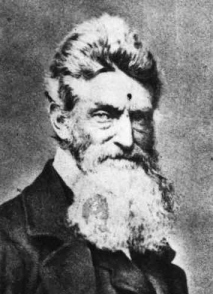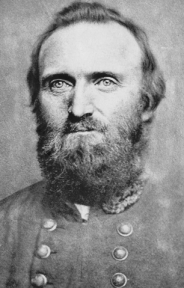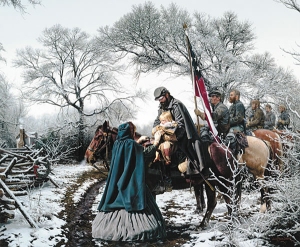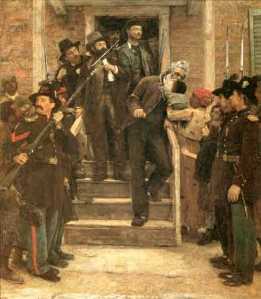I’ve read a great deal about Thomas J. Jackson the last few weeks … and just about as much about what people think of him, how we should remember him, the impact of the emphasis placed upon his wounding at Chancellorsville, the cause of his death, and the place where he died.
I admit that I’ve never given a lot of thought to Jackson. As a child, he fascinated me more than any other Confederate general. I recall an image of him being hit at Chancellorsville in a child’s Civil War book and his profile (in blue) on a small calendar distributed by local stores marking his date of birth (why that would be I do not know). That blue image confused me a bit, although that may be why I was so interested in him … which side was he on?
It did not take long to resolve that confusion. Over time, however, I can’t say that my understanding of him changed all that much. It’s safe to say that I accepted without question that he was a brilliant if erratic, even quirky, general who was invaluable to Confederate success in Virginia until his death 150 years ago. The story of his having proposed an attack with men armed with nothing but Bowie knives and wearing nothing but what they came into the world wearing might be discredited, but that such a story even existed made one wonder about the man. Here and there I came across glimpses that suggested that he was something more, a man who was merciless in the way he waged war despite stories of his gentleness and Christian faith. There was the tale of how he disagreed with the notion of refusing to cut down a particularly courageous Union officer with the words, “Kill the brave ones; they lead on the others.” That smacked of Patton’s notion that the goal of fighting was not to die for your country but to make the other guy die for his (or words to that effect). Then there was that comment at Fredericksburg where he reflected upon the horror of war but said that there was only one way to end it: “Kill them, sir! Kill every man!”
There was something fierce, cold-blooded, and unromantic about the man. There was something about him that suggested the Christian warrior with the Old Testament thirst for revenge. There was something to be said for his unsparing devotion to a cause.
And then it came to me just this week. When I thought of Stonewall Jackson, who else came to mind?
That’s right … John Brown.
Now I’m sure this will get some people upset. Wasn’t Brown a terrorist, while Jackson was a gallant soldier? Or wasn’t Brown a freedom fighter, while Jackson fought to secure the independence of a slaveholding republic?
Well, what you see depends on where you stand.
What I see are two very dedicated men who were unsparing in their assessment of what it would do to prevail as Americans struggled over what would become of their republic. They understood that to win, blood would be spilled, and they were starkly unromantic about that. Each is viewed as a fallen hero, a man whose greatest moment may have been his last.
Now, I don’t happen to venerate John Brown. However, I reject the notion that he was crazy, just as I reject the notion that the citrus-sucking Jackson was a few bricks shy of a full load. Brown’s plan to take Harper’s Ferry was nowhere near as successful as Jackson’s later campaign against it, and one wonders how it came together in his mind, but no matter. These were men who embraced violence and killing as a way to get what they wanted. Jackson wasn’t worried about whether he’d grow too fond of war if it wasn’t for its horror: he accepted it without flinching.
Both men read the Bible and believed in what it said.
And yes, I understand that both men had their gentler, compassionate side, at least as represented in celebratory art:
In short, these two folks had more in common than many people would like to believe, and some would say that it is precisely those common characteristics that help make them fascinating subjects for some to study and for others to venerate.




To “think” about any Confederate, and gloss over their stated purpose — to spread slavery for GOD — is an insult to everyone who stood up to these lunatics.
IF there is a failure of US history, it is to teach the ugly truth. Southern ULtimatums, before the Civil War, were loud and proud –spread slavery or there will be war. Not kinda, not sorta, but clear, specific demands to spread slavery.
And not spread it by “popular sovereignty” which would be bad enough. Not spread it by the excuse of “states rights”. By May of 1861, Southern leaders had no excuse – Kansas voted against slavery 98% to 2%. Yet Davis and Southern leaders demanded, with a promise of war — the spread of slavery in Kansas. Proudly. The did not mumble, they did not equivocate, it’s in their own headlines, their own documents, and it’s part of the own constitution. Slavery MUST be spread into KANSAS.
Jackson did not personally own any slaves, but h is family sure did. The vile canard of Jackson as a man of faith, because he helped slaves learn the bible, is as goofy and misleading as all such stories. The only reason South was the bible belt, the only reason they supposedly taught slaves about the bible, was to teach them the parts about slaves obeying their masters.
It’s been 150 years folks. It’s time, it’s past time, we quit this nonsense about honorable brave Southern leaders. Jackson was not killed in battle, he was killed by his own troops as he was returning to camp, some evidence that he was wearing Union officers uniform, which would have been taken off a dead US soldier.
The Confederates were not honorable, their leaders not principled or brave. According to Jeff Davis wife 18 page letter, he was wearing three layers of female attire, from the top of his head to his ankles, and she specifically wrote, “I SAID IT WAS MY MOTHER”/
Imagine if Lincoln had girls tied up and whipped, as Lee’s own slave ledgers show, imagine if Lincoln ran away in his wife’s dress, leaving his children to the enemy. This is the kind of lunacy we have in US history — we smear honorable men, while praising child whipping cowards.
Either give us real history, or don’t teach it at all.
That’s a pretty insightful analysis and I hadn’t thought about the similarities until just now. I agree that neither was “crazy”, although Brown had that “look”. But I do think that both were fanatics and I generally see trouble where mere mortals are convinced that they’re doing “God’s work”. My issues with Jackson are different and narrower, however. They have to do with the way he has indeed been “venerated” in a sense in which Brown has not. Simply put, the guy was no military genius even though, some 150 years later, that notion still persists in quite a few circles. As I’ve said before, he repeatedly demonstrated that he was a mediocre tactician, for all of his somewhat counterbalancing talent at driving his troops on the operational level. (See; First Kernstown, Front Royal, Port Republic, the Seven Days, Cedar Mountain, Brawner’s Farm, Second BR Day 2, Hamilton’s Crossing at Fredrticksburg) He contributed to his tactical shortcomings with his aberrant and friction-laden dealings with his subordinates. The idea that defeat for the CSA turned on what happened on a moonlit road in May, 1863 is to me a case in which in which facts are obscured by romantic fiction. I’m not big on having too much fun with counterfactuals, but I’ve never bought into the fantasy that had Stonewall been present instead of Dick Ewell at 4 P.M. on July 1, 1863, Gettysburg would have been a Yankee defeat, the ANV would have gone on to glorious victory, etc., etc., etc.. Instead, Stonewall most likely would have slowly dribbled a few regimants in the direction of Cemetery Hill while the Yanks put together a strong defensive position – or even snoozed the afternoon and evening away after an exhausting several days marching frantically hither and yon throughout southern Pennsylvania. After all, both had happened before. And those are facts.
What an interesting comparison, and one I think is entirely on target. Both religous zealots, and both completely ordinary and unprepossessing until seized by a cause. I imagine Jackson was a boring plodder, and Brown a bumbling ne’er do well until their passions were aroused. Maybe part of our fascination is they remind us that ordinary people really can do extraordinary things.
Great post. Here’s my favorite Civil War image:
Good post, and great minds think alike. Wendell Phillips made the connection during the war, comparing Jackson, a “honest fanatic on the side of slavery,” just as John Brown had been a “fanatic” on the side of freedom. (The implication, I think, was the dubious idea that the Union needed a general like Brown.) That comparison between Jackson and Brown is so cool that it’s in the opening of the first chapter of my book _Inventing Stonewall Jackson: A Confederate Hero in History in Memory._ (LSU, 2011). Ironically, Phillips had no way of knowing much about Jackson at that time..
Hope I’m not imposing, but here’s a link to my HNN essay of this week on the anniversary of Jackson’s death. Don’t miss the comments, where I am referred to as a “self-professed professor.”
http://hnn.us/articles/its-not-you-stonewall-its-me
Wallace Hettle
University of Northern Iowa
I think you missed this …
As for Michael Lamb, we share a fan, as you can see from this blog’s archives.
First of all, Jackson did own slaves.
1860 Census for Lexington, VA says Thomas J Jackson had $3800 in real estate and $5200 in personal estate. On June 2, 1860, Jackson owned 4 slaves, M, 40, F, 40, M, 17 and F, 15.
On August 1, 1860, RE Lee (US Army) was listed as having $80,000 in real estate. On 31 July, 1860, R.E. Lee, of Arlington, Alexander Cty, Vir, was the owner of 40 slaves.
In comparison, in 1860, Abraham Lincoln had $5,000 in real estate and $12,000 in personal estate.
“The Confederates were not honorable, their leaders not principled or brave.” If you’re discussing the military men you are completely wrong, particularly about Jackson, Lee and Joe Johnston. None supported secession in 1860, or cared a fig about slavery. They did however, believe in “States Rights” and and thought their first loyalty was to Virginia not the USA. They were principled, if wrong-headed, men – respected by the North including men like McClellan, Grant and Sherman – before and after the war. People don’t want to see the Civil war for what is was, a tragedy – a political fuck up of monumental proportions. So they turn it into a “noble crusade” to end slavery or the “lost cause” nonsense.
I disagree. If they were principled in being loyal to Virginia not the USA, then they lied in their oath as US Army officers.
Lee didn’t “care[] a fig about slavery”.. Reading the Man gives us a different portrait based on Bobby’s own words and deeds. If you’re.going to challenge misinterpretations of the war, let’s add the Saint Robert mythology to the list.
Its amazing that Robert E. Lee, born in 1809 and raised in a society that thought Slavery wasn’t an evil but a positive good in many ways was so apathetic about Slavery. Reading his letters and books written about him its obvious he didn’t care a fig about Slavery and would have been perfectly happy with some sort of compensated gradual emancipation. Its sad that principled men like himself and Joe Johnston, who couldn’t raise their hand against their own state, were really responsible for triumph of the people he despised the most namely the Centralizers and Abolitionists who hated the South. Without generals like Jackson, Lee, and Joe Johnston, the Confederacy would’ve fallen much sooner than it did, with a more moderate -softer peace.
“i disagree. If they were principled in being loyal to Virginia not the USA, then they lied in their oath as US Army officers.”
Weird that no one thought they lied at the time. When Va and the USA did not conflict they stayed in the US army, when FORCED to choose, they resigned.
Oh I think plenty of people thought that their act of breaking their oath was problematic, to say the least. Certainly the example of Southerners like Thomas and Gibbon who stayed loyal to their oath offers implicit condemnation of those who did not. Moreover, the fact that Lee, Jackson, et al, stayed loyal to their oath when nothing conflicted with it says little about their principles one way or another…it is easy to keep your word when nothing tempts you to do otherwise. And they did a little more than just ‘resign’ from the US Army when their oath was put to the test.
I understand your point that Lee, Jackson and Johnson were not pro-slavery firebrands. However, they were smart enough and perceptive enough to realize that by taking up arms for the government that prevailed in the South they were, at the very least, constructively fighting to uphold the beliefs put forward by Alexander Stephens in the Cornerstone Speech…beliefs that evidenced great interest and enthusiasm for slavery.